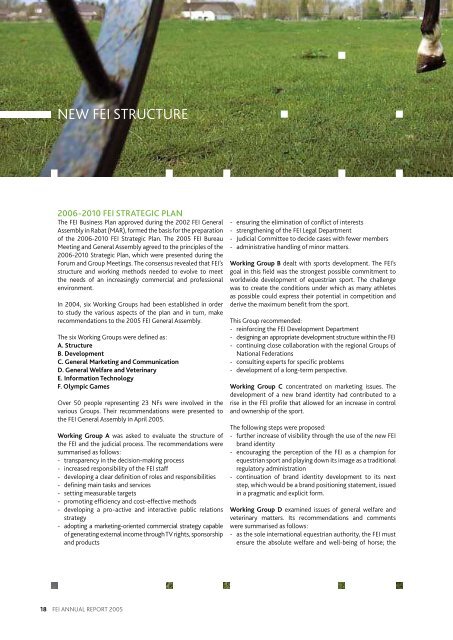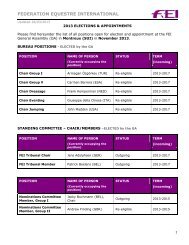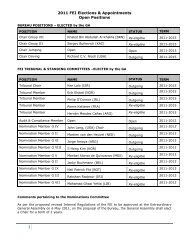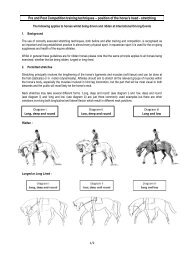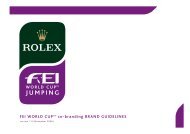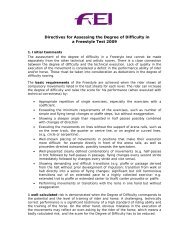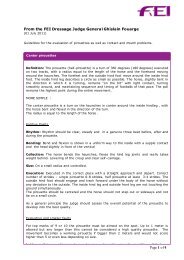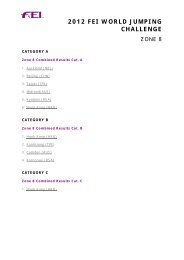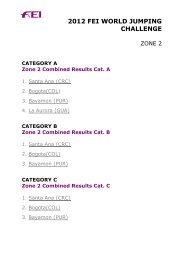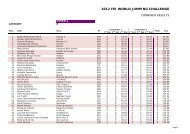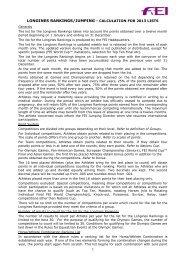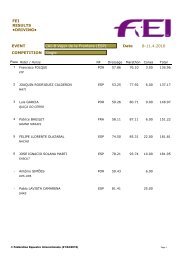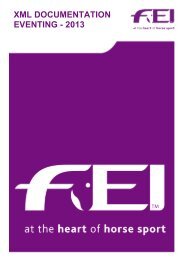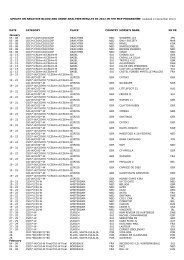here - FEI
here - FEI
here - FEI
You also want an ePaper? Increase the reach of your titles
YUMPU automatically turns print PDFs into web optimized ePapers that Google loves.
NEW <strong>FEI</strong> STRUCTURE<br />
2006 - 2010 <strong>FEI</strong> STRATEGIC PLAN<br />
The <strong>FEI</strong> Business Plan approved during the 2002 <strong>FEI</strong> General<br />
Assembly in Rabat (MAR), formed the basis for the preparation<br />
of the 2006-2010 <strong>FEI</strong> Strategic Plan. The 2005 <strong>FEI</strong> Bureau<br />
Meeting and General Assembly agreed to the principles of the<br />
2006-2010 Strategic Plan, which were presented during the<br />
Forum and Group Meetings. The consensus revealed that <strong>FEI</strong>’s<br />
structure and working methods needed to evolve to meet<br />
the needs of an increasingly commercial and professional<br />
environment.<br />
In 2004, six Working Groups had been established in order<br />
to study the various aspects of the plan and in turn, make<br />
recommendations to the 2005 <strong>FEI</strong> General Assembly.<br />
The six Working Groups were defined as :<br />
A. Structure<br />
B. Development<br />
C. General Marketing and Communication<br />
D. General Welfare and Veterinary<br />
E. Information Technology<br />
F. Olympic Games<br />
Over 50 people representing 23 NFs were involved in the<br />
various Groups. Their recommendations were presented to<br />
the <strong>FEI</strong> General Assembly in April 2005.<br />
Working Group A was asked to evaluate the structure of<br />
the <strong>FEI</strong> and the judicial process. The recommendations were<br />
summarised as follows :<br />
- transparency in the decision-making process<br />
- increased responsibility of the <strong>FEI</strong> staff<br />
- developing a clear definition of roles and responsibilities<br />
- defining main tasks and services<br />
- setting measurable targets<br />
- promoting efficiency and cost-effective methods<br />
- developing a pro - active and interactive public relations<br />
strategy<br />
- adopting a marketing-oriented commercial strategy capable<br />
of generating external income through TV rights, sponsorship<br />
and products<br />
18 <strong>FEI</strong> ANNUAL REPORT 2005<br />
- ensuring the elimination of conflict of interests<br />
- strengthening of the <strong>FEI</strong> Legal Department<br />
- Judicial Committee to decide cases with fewer members<br />
- administrative handling of minor matters.<br />
Working Group B dealt with sports development. The <strong>FEI</strong>’s<br />
goal in this field was the strongest possible commitment to<br />
worldwide development of equestrian sport. The challenge<br />
was to create the conditions under which as many athletes<br />
as possible could express their potential in competition and<br />
derive the maximum benefit from the sport.<br />
This Group recommended:<br />
- reinforcing the <strong>FEI</strong> Development Department<br />
- designing an appropriate development structure within the <strong>FEI</strong><br />
- continuing close collaboration with the regional Groups of<br />
National Federations<br />
- consulting experts for specific problems<br />
- development of a long-term perspective.<br />
Working Group C concentrated on marketing issues. The<br />
development of a new brand identity had contributed to a<br />
rise in the <strong>FEI</strong> profile that allowed for an increase in control<br />
and ownership of the sport.<br />
The following steps were proposed:<br />
- further increase of visibility through the use of the new <strong>FEI</strong><br />
brand identity<br />
- encouraging the perception of the <strong>FEI</strong> as a champion for<br />
equestrian sport and playing down its image as a traditional<br />
regulatory administration<br />
- continuation of brand identity development to its next<br />
step, which would be a brand positioning statement, issued<br />
in a pragmatic and explicit form.<br />
Working Group D examined issues of general welfare and<br />
veterinary matters. Its recommendations and comments<br />
were summarised as follows :<br />
- as the sole international equestrian authority, the <strong>FEI</strong> must<br />
ensure the absolute welfare and well-being of horse ; the<br />
authorities and general public must be assured that horses<br />
involved in equestrian sports were well treated and were<br />
not at any risk of being abused.<br />
- a key to long term public acceptance was a clear understanding<br />
of the difference between legitimate medication<br />
and doping<br />
- maintaining a medication control programme that allowed<br />
for proper treatment when needed without interfering in<br />
the principles of a fair competition<br />
- further development of a speedy analysis, reporting and<br />
follow - up process linked to a clear communication procedure<br />
- implementing proper penalties within an acceptable time<br />
frame<br />
- providing regular educational tools to officials and riders<br />
- reviewing the veterinary examination and horse inspection<br />
system<br />
- reviewing and issuing recommendations for transportation,<br />
disease prevention, competition frequency and training<br />
intensity<br />
- further development of a horse database<br />
- development of a clear <strong>FEI</strong> positioning statement on animal<br />
welfare.<br />
Working Group E dealt with information technology. The <strong>FEI</strong><br />
information system should become the cross point of all actors<br />
of equestrian sport by providing solutions that reinforce its<br />
position on the international sport scene, while respecting fair<br />
play and the welfare of the horse. The <strong>FEI</strong> had an important<br />
mission in providing information to all stakeholders of the<br />
sport. The Working Group E recognised the efforts made to<br />
date and recommended:<br />
- registering all riders and horses participating at international<br />
level in a central registry<br />
- revising the <strong>FEI</strong> horse passport system<br />
- user-friendly tools to access and use the available data<br />
- use of a single and functional information system as an<br />
important instrument in the promotion of the sport and<br />
the reinforcement of the <strong>FEI</strong> credibility.<br />
Working Group F concentrated on the Olympic Games which<br />
were paramount to equestrian sport. The link between the <strong>FEI</strong>,<br />
the National Federations, the National Olympic Committees<br />
and the International Olympic Committee was crucial. The<br />
Olympic Games gave the <strong>FEI</strong> and its member NFs a “raison<br />
d’être.” Furthermore, the financial implications of this link had<br />
a direct effect on the development of the sport worldwide as<br />
it supported the institutionalisation of services provided by<br />
the <strong>FEI</strong> and its member NFs.<br />
Working Group F recommended:<br />
- the reinforcement of equestrian sport by encouraging the<br />
organisation of national and regional championships thus<br />
increasing competition opportunities and further global<br />
representation of the sport<br />
- involvement by the <strong>FEI</strong> of IOC and NOC members in the<br />
sport by regularly inviting and accompanying them to<br />
important equestrian events<br />
- affordability of equestrian sports for Olympic Games<br />
Organising Committees must be ensured through strict<br />
control of costs and venues size supervised by the <strong>FEI</strong><br />
- reviewing of the Olympic equestrian programme to ensure<br />
that it remained dynamic and allowed for quality TV<br />
coverage<br />
- inclusion of a fourth equestrian discipline within the<br />
Olympic programme.<br />
<strong>FEI</strong> STRUCTURE<br />
Following the 2005 General Assembly, the Executive Board<br />
appointed a Steering Group to conduct the proposed modernisation.<br />
This Group reported to an Extraordinary <strong>FEI</strong> Bureau<br />
Meeting in Lausanne (SUI) on 14 September 2005. The Bureau<br />
decided to ask the <strong>FEI</strong> Strategic Planning Committee (SPC)<br />
to form a Working Group to supervise the next phase of the<br />
implementation of the structural changes. The SPC Working<br />
Group reported its progress to the <strong>FEI</strong> Bureau during its fall<br />
meeting in Bahrain (BRN). A further report will be made at the<br />
2006 General Assembly in Kuala Lumpur (MAS).<br />
<strong>FEI</strong> ANNUAL REPORT 2005 19


